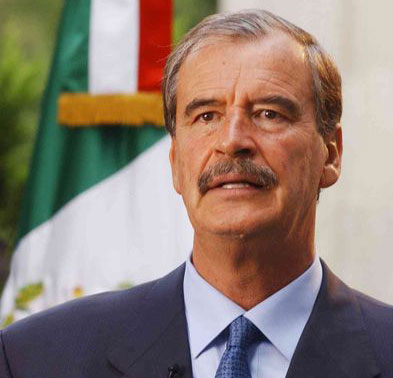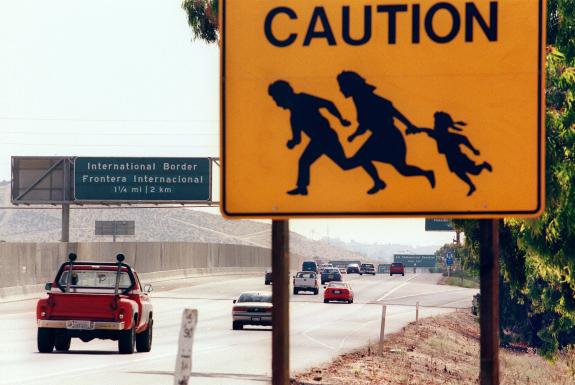The law sets out maximum “personal use” amounts for drugs, also including LSD and methamphetamine. People detained with those quantities will no longer face criminal prosecution.
 Former Mexican president Vicente Fox, left, who has watched a national drug war claim 35,000 lives in less than four years under his successor, Felipe Calderón, says that “Legalization does not mean that drugs are good,” he wrote in an Internet posting, according to Reuters, “we have to see legalization of the production, sale, and distribution of drugs as a strategy to weaken and break the economic system that allows cartels to earn huge profits”.
Former Mexican president Vicente Fox, left, who has watched a national drug war claim 35,000 lives in less than four years under his successor, Felipe Calderón, says that “Legalization does not mean that drugs are good,” he wrote in an Internet posting, according to Reuters, “we have to see legalization of the production, sale, and distribution of drugs as a strategy to weaken and break the economic system that allows cartels to earn huge profits”.
Since Mexican President Felipe Calderon deployed the military in 2007 to combat violent drug cartels, violations of human rights, especially along the border area with USA, have skyrocketed. Security forces have committed widespread abuses against civilians including rape, torture, and “disappearances,” yet virtually none of the soldiers and police responsible have been held accountable. Mexico’s National Human Rights Commission has also received nearly 5,000 allegations of human rights violations against the military since 2007.
‘War on Drugs’ failed
Despite of increase of drug related killings and wide spread human rights abuses, Mexico continued to rely on military trials to investigate and prosecute soldiers alleged of criminal acts. However, during time of Calderon’s administration only one soldier was brought to justice for human rights violation. Current administration has paid little attention to fact that using military courts to prosecute human rights abuses is a violation of Mexico’s international human rights obligations, and the Inter-American Court on Human Rights has repeatedly ruled that Mexico should try such abuses in civilian courts.
José López, right, last year laurea te of Rafto Foundation, has criticised the earlier policy of fighting drug trafficking. J. López has stated that such approach to drug war does more harm than good and has tremendous consequences on Mexican population. ”I perceive this institutional war as a mere simulation, because the main elements supporting and feeding the power of criminal mafias are not being targeted, namely: flow of money and political support’’.
te of Rafto Foundation, has criticised the earlier policy of fighting drug trafficking. J. López has stated that such approach to drug war does more harm than good and has tremendous consequences on Mexican population. ”I perceive this institutional war as a mere simulation, because the main elements supporting and feeding the power of criminal mafias are not being targeted, namely: flow of money and political support’’.
Organised crime mafias have infiltrated Mexican political structures, and public institutions in charge of law enforcement and security to an alarming extent. Economic power used by mafias to corrupt people at all levels is increasing exponentially. To make matters worse, the government confronted drug cartels in warlike manner- relying heavily on armed forces, with little or almost no law enforcement, and appearing increasingly weak against the power of criminal gangs. The new policy and decriminalisation of drugs may indeed accommodate several points of J.Lopez approach. Mainly dealing with the side effects- kidnappings, corruption, money flows.
Immigration law could save thousands:
One of the most serious issues regarding human rights abuses has been Mexican national law which criminalise people who using Mexico as passing point to the United States. Mexican policy on drug trafficking is directly linked to rights of immigrants. Large number of people from Central and South America using Mexico as passing point to United States, in turn the large portion of immigrants are targeted by drug cartels and become victims of human trafficking. In effect various drug cartels receive more money which are often used to corrupt state officials.
has been Mexican national law which criminalise people who using Mexico as passing point to the United States. Mexican policy on drug trafficking is directly linked to rights of immigrants. Large number of people from Central and South America using Mexico as passing point to United States, in turn the large portion of immigrants are targeted by drug cartels and become victims of human trafficking. In effect various drug cartels receive more money which are often used to corrupt state officials.
Bishop Raúl Vera and a large group of human rights organisations criticised the recently proposed revision to the law as it means these migrants will maintain their illegal status. It will also continue to encourage them to use clandestine means of transportation that expose them to a high risk of being abused by organised local criminal groups. Luis Arriaga Valenzuela, director of the Miguel Agustín Pro Juárez Human Rights Center (Center Prodh), emphasised the range and gravity of the situation by referring to official statistics indicating that more than 22 000 immigrants are kidnapped by criminal gangs every year. This practice particularly affects female migrants, most of whom are sexually abused at some point along their route through Mexico. The situation has been strongly condemned by international human rights bodies. Alejandro Anaya Muñoz, researcher at the Center for Economic Research and Education (CIDE), shared data from his studies of migration, which served to strengthen the assumption of a connection between the abuse and the fact that migrants travel in a clandestine manner and by means of transport which makes them vulnerable to attack and kidnapping.
Related stories
Rafto laureate’s appeal to end violence against migrants in Mexico
Rafto laureate Bishop Raúl Vera launches Transmigrant Visa proposal


